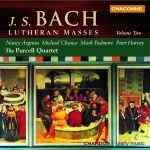
Lutheran Masses, Vol 2 (BWV529 & 236)
 $28.00
Out of Stock
$28.00
Out of Stock2-6 weeks add to cart
J.S. BACH
Lutheran Masses, Vol 2 (BWV529 & 236)
Nancy Agenta (soprano) Michael Chance (counter-tenor) Mark Padmore (ten) Peter Harvey (basses) / Purcell Quartet
[ Chandos / CD ]
Release Date: Tuesday 1 February 2000
This item is currently out of stock. We expect to be able to supply it to you within 2 - 6 weeks from when you place your order.
'The Singers balance beautifully… and oboes shadowed their parts and thicken the texture. Everyone bounced along in autonomous counterpoint.'
Evening Standard on the concert of this recording
Following the enormous success of the first disc, this recording was made after an exhilarating concert at the Wigmore Hall.
Michael Chance said of the project: 'Performing Bach with solo voices and strings is a very daunting prospect for a singer, but when it works it really is a most satisfying experience. The first disc in the series was a real treat and this one promises to be equally exciting.
Lively debate continues regarding the authentic performance practice of Bach's church music. Many believe that multiple strings and massed voices were used, whereas others (notably Joshua Rifkin) are sure that single strings and solo voices are employed. This disc features solo voices and single strings, and is the first known recording of these works suing such forces.
Nearly half a millennium ago mounting tension within the Western Church exploded in the crisis of the Reformation. Given the extreme rejection by some Reformed churches of Roman observances, English audiences might be surprised to find parts of the Latin Mass still included in the foremost composer of Luther's Church. Luther's quarrel was not so much with the liturgy - he had been an Augsutinian monk from the age of twenty-two - but rather with the corruption in the hierarchy of the church itself. In the two-hundred years separating Luther's publication of the Formula Missae and Bach's appointment as Thomaskantor in Leipzig, church music in Germany had attracted and exercised the talents of many fine composers and some considerable geniuses. By Bach's time even Luther's hymns had acquired a patina of age and Latin had all but disappeared except in some large churches. Bach's 'Lutheran' Masses use almost no Lutheran raw material. Formally they could be classified as 'Neapolitan' masses, and they are only masses in a technical sense of Missa, not complete settings of the Ordinary. They are however deeply Lutheran and Bachian in spirit, music in which it is hard not to be moved by the sense of a big and complex resolution of dissonance. 'I place music next to theology and give it highest praise,' (Martin Luther)
Tracks:
Trio Sonata, BWV 529
Mass, BWV 236
Mass, BWV 233

